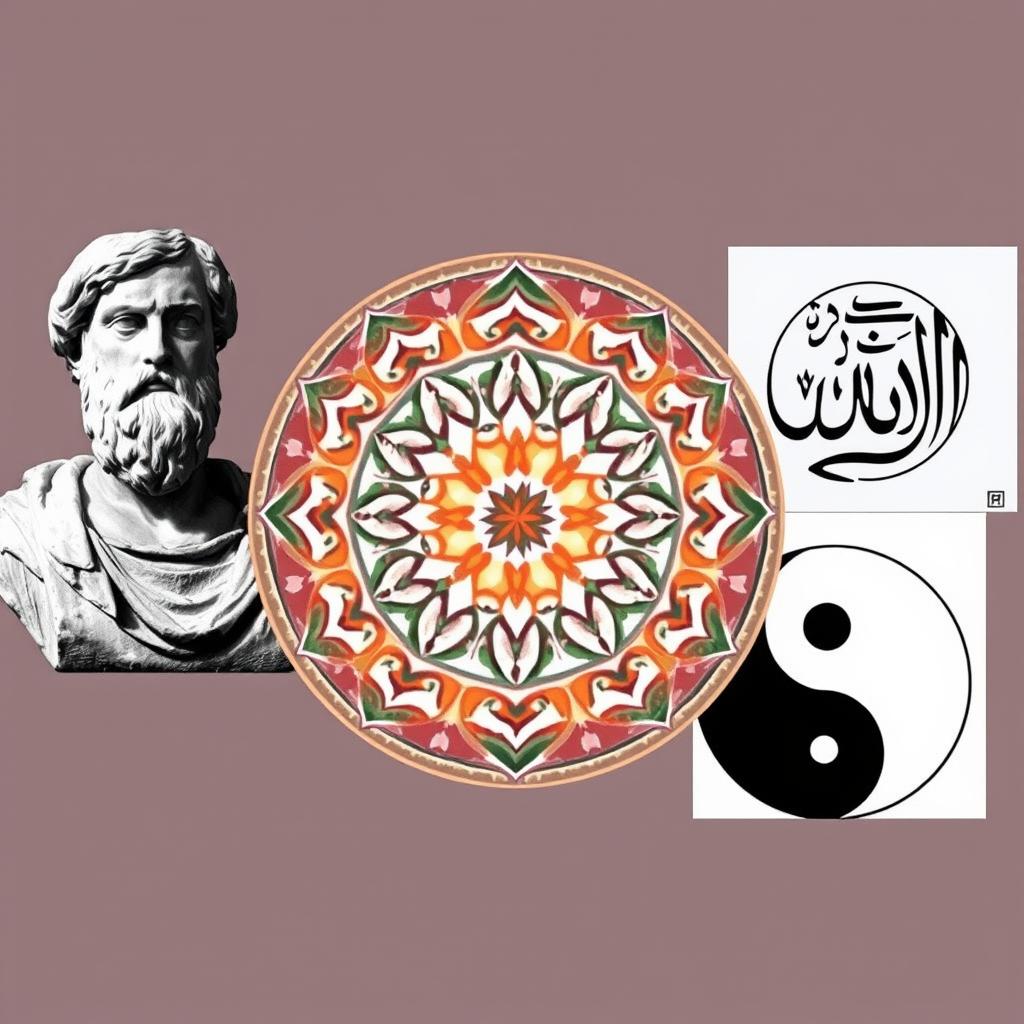Dr. Muhammad Maroof Shah
Philosophy for ancients and Plato is not a mere theoretical rational inquiry but a realization, intellection or noetic vision that transcends subject-object duality and demands something like ethical discipline. For traditionalist sages and other advocates of traditional philosophy (that encompasses Indian, Chinese, Far Eastern, Islamic, Judeo-Christian and wisdom traditions) philosophy in the primordial sense of the term prepares one for death and assimilation to God as Plato said and is not a rational logical abstract discipline only and is allied to gnosis, a way of life or realization of the good. As It involves not just ratio or mental faculty of reason but nous, the supraindividual universal faculty of intellect as well and the later makes all the difference.
Philosophy, Algis Uzdavinys notes in his introduction to The Golden Chain: An Anthology of Pythagorean and Platonic Philosophy, in the traditional Orphic-Pythagorean sense is wisdom and love combined in a moral and intellectual purification in order to reach the “likeness to god.” It involves contemplation of Beauty and Good.
In fact all contemplation is a form of death of self/mind. All meditation and contemplation, especially on the void called death, leads to death of the will, the will of the Other or non-self or what may be in theological terms called God is a sort of the death of the willing self. Virtue becomes possible only after this death of the soul, the soul as conative faculty.
“For Plato and the ancients, philosophy was not mere intellectual inquiry but a path of purification, contemplation, and preparation for death. It was a way of becoming like God, rooted in discipline, wonder, and noetic vision.”
The Greek word nous covers both spirit and intellect (intellectus, ‘aql) of Medieval Christian and Islamic lexicon. Platonic philosophy should be understood as a spiritual and contemplative way of life leading to illumination or enlightenment; an intellectual discipline based on intellection culminating in union (henosis) with ideal Forms. This concurs with “Orphic”-Indian conception of philosopher as one who seeks release from the wheel of cyclical term.
It is one of the key blunders of modern discipline called philosophy, according to traditionalist critics, that it has been largely forgetful of the Pythagorean-Platonic notion of philosophy as a pathway of communion with God. Indeed post-Arsitoltlean philosophy in general and modern philosiophy in particular has been forgetful of the notion of what Heidegger calls thinking and Plato would perhaps call attention to death, pure receptivity to Being that reveals itself not to conceptual intellect but to intellection.
Plato would mourn absence of key preoccupations of ancients in the mansions of modern philosophy and warn against occupation with trivialities, not unlike Heidegger who finds the most important questions being relegated to background or oblivion in his contemporaries.’

“Traditional philosophy across civilizations—Greek, Indian, Chinese, Islamic, Judeo-Christian—was never divorced from spiritual practice. It sought moksha, enlightenment, and inner transformation rather than logic-chopping or abstraction.”
Receptivity to Being achieved by fana in Sufism or consent to become nothing after transcending egocentric view in other traditions including Indian ones, is what is preparation for death. This alone gives the view of the world as full of wonder and beauty. Traditional aesthetics assumes that the joy of art arises from transcendence of ego by contemplating art forms. Modern philosophy has vetoed mystery and wonder and thus lost that great virtue of being humble and receptive towards unrepresentable truth in phenomena.
Plato’s insistence on preparation for death is not invitation for speculating on our posthumous states but achieving, with mystics across traditions, death in life so that one achieves primal innocence that Adam has lost after the Fall that involves seeing objects as separate from subject or what amounts to the same thing as seeing things egoistically, dualistically or outside God.
Sufis are supposed to die every moment so that they fully enjoy freshness of revelations of Being. God consciousness is identified in different traditions (especially in Zen and Sufism) with present moment or Eternal Now, achieved by dying to both past memories and future anxieties. Simone Weil’s definition of God as “attention without distraction” perhaps echoes Plato whom she so deeply loved and converges with this notion of philosophy as cleansing and sharpening of perception. Philosophy in traditional sense gives us eyes to see, to perceive without distraction or colouring from egocentric desires and passions and ultimately to dissolve into objects so that only seeing is there without a seer and that dissolves all epistemological problems, so to speak.
We again need philosophy as transformative practice that through rigourous ethical discipline (something absent in modern armchair discipline of philosophy as if it is learning new information or solving logical puzzles) results into a state of supreme clarity of understanding and joy and peace that passeth understanding.
Philosophy as a practice of the self, as esoteric discipline allied to mysticism and needing proper initiation and not a profane discipline, logic chopping or linguistic analysis or calculus of abstractions or speculative exercises is what Plato stood for and no wonder we find the notion of preparation of death so anachronistic as we have forgotten what philosophy stood for in ancient times. Tolumin has also observed in his Philosophers: East and West that only sage can be a philosopher in oriental civilizations and in modern Western philosophy this is not a required qualification and even ideally it is a hindrance.
Schuon suggests to reserve the name of philosophers for sages and to describe rationalists as profane thinkers. Philosophy, as Algis Uzdavinys notes, is, according to the best of the Greeks, to express by means of reason certainties “seen” or “lived” by the immanent Intellect. I am tempted to quote from perennialists, much ignored critics of modern philosophy but great advocate of Plato and traditional philosophy. Perennialists, bringing in the witness of countless traditional sages throughout the world regard ancient philosophy as:
essentially a way of life: not only inseparable from “spiritual exercises,” but also in accord with cosmological myths and sacred rites. In the broader traditional sense, philosophy consists not simply of a conceptual edifice (be it of the order of reason or myth); but of a lived concrete existence conducted by initiates, or by the whole theocenrtric community, treated as a properly organized and well guided political and “theurgical body” attended to the principle of maat — “truth” and “justice” in the ancient Egyptian sense of the word.
“Modern philosophy has largely forgotten its sacred roots. Where Plato urged us to prepare for death and transcend ego, today’s philosophers often busy themselves with puzzles, neglecting the mystery and wonder of Being.”
Ancient philosophers tried to awaken the divine light through the noetic vision (noesis) and to touch the divine Intellect and thus may be described as moksa centric. This calls for few comments given the reservations expressed by Indian philosopher Daya Krishna on this characterization.
Moksha (though understood somewhat differently) is the ultimate though not the immediate goal of Indian philosophy, Muslim philosophy, Platonic-Phythogorean philosophy, Chinese Philosophy and many other traditional philosophies. Moksha centrism, as Harsh Narain explains, serves to: give purpose and direction to philosophy and proved to be a bulwark against battling in the clouds, which Sri Aurobindo calls the ‘besetting sin of metaphysics,’ and which is the bane of unbridled, directionless thinking for thinking’s sake.
Praxiological commitment makes all the differences. Modern Western philosophy lacks such a serious purpose, direction and orientation. Nobody knows what it is out to do. Ancient philosophy aimed at enlightenment and felicity with or without salvation at the great denouement, whereas current philosophy aims at dry clarity and mechanical precision on their own account.
This also explains close association of religion and philosophy in traditional cultures. This explains ultimate religious-mystical aim of philosophy as preparation for death in Plato.
Author can be mailed at marooof123@gmail.com


Comments are closed.